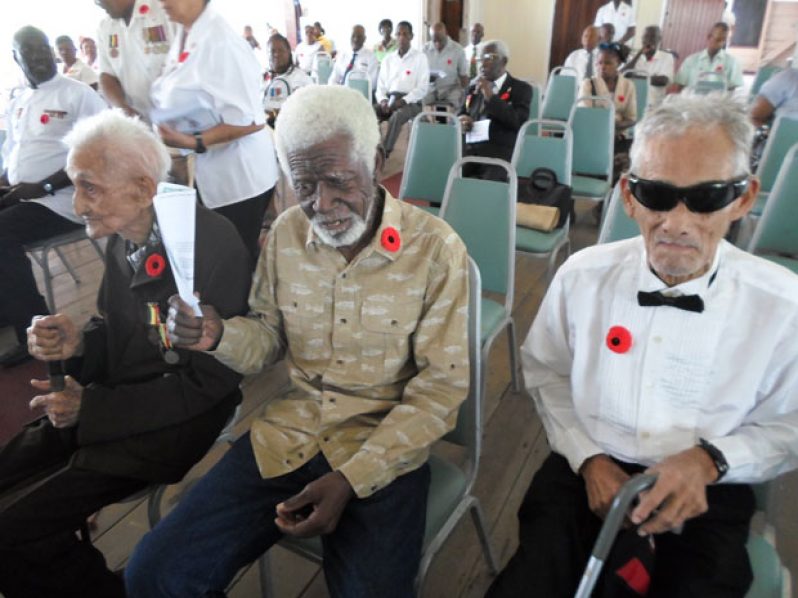EX-SERVICEMAN Cecil Cunha, who was born on June 25, 1914, is today the longest serving veteran. At 99, he incredibly musters the strength and will-power to be present at every Remembrance Day ceremony hosted in honour of the Guyana Legion of Ex-Servicemen. And this he considers his duty, being a loyal serviceman.
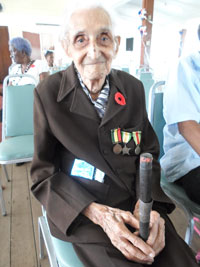
Last Sunday, Mr. Cunha headed a list of four of the longest surviving servicemen who attended the reception to commemorate Armistice Day 2013 at Coghlan House on Carifesta Avenue. The four oldest, in order of highest ranking, were: Cecil Cunha, 99 yrs 6 months; Benjamin Durante (who on Friday turned 97); Edgar Mittleholzer, 89; and Joseph Rodney, 88. Mr. Hector Bunyan, who passed away on Sunday, August 19, 2012, 48 hours ahead of his 90th birth anniversary, would have been the third oldest, had he lived.
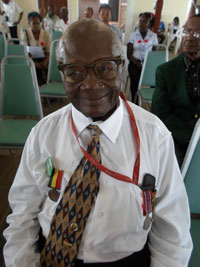
Bunyan was a member of the British Guiana Contingent that formed part of the South Caribbean Forces during the days of World War II, (spanning 1939-1945). That body, comprising conscripted members from the various Caribbean territories, was put together by the English during 1945, and functioned as a support or back-up group to frontline soldiers.
Mr. Cunha spent practically all his working life as an employee of the Postal and Telecommunications Department, which was then headed by the Post Master General.
Today, it is with pride and perhaps a degree of nostalgia that he reflects on responsibilities that devolved on him during the period of World War II.
It was at approximately 10:00 hrs on that auspicious Sunday morning at Coghlan House, where the crowd was fast building up, that Cecil Cunha, a stickler for discipline and with the highest regard for time, arrived in the auditorium in good time, under the escort of his youngest son. He was readily recognized
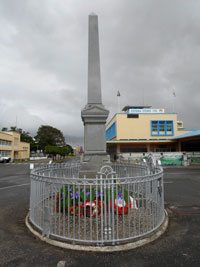
by literally all and sundry, and a few persons spontaneously gravitated towards him to greet and pay their respects to a serviceman who had performed his duties with distinction.
As I walked across to greet him once more, and naturally invite a few comments from him, the Police Band, which by now has earned the enviable reputation of singularly regaling the audience with their choice symphonic renditions, was just beginning to warm up. But on realizing that this distinguished son of the soil, who has a hearing impediment, was about to be interviewed, the bandsmen graciously withdrew to allow him some time; and naturally, I kept it short and crisp. This gesture I considered very noble and dignified, and would like to record our appreciation to the members of the Police Band.
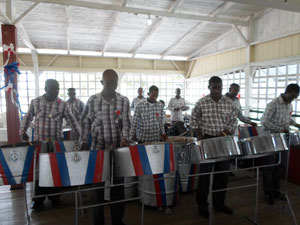
It was with an aura of pride, and indeed a sense of accomplishment, that he began the interview, and this is how a man at 99 put his experience in context:
“I am the sole surviving member of the British Guiana/Brazil Boundary Commission which was established by the British Government in 1929 and got into execution in 1930.
I was invited to join the Commission in 1934, and served until 1938, when the Commission came to a
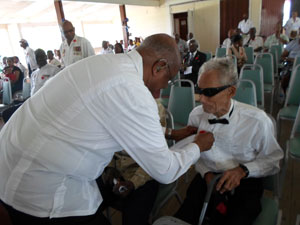
close – from Mount Roraima to the source of the Corentyne.
“I was appointed assistant commissioner by the Government, and was in charge of the Government wireless telegraph station at Mackenzie, and served all through the period of the war, from 1939 until 1945. I had, vested in me by Government, the power to meticulously read every telegram passing through the system, as a form of surveillance, to detect if they contained any subversive information. I had the power to refuse any telegram that was considered subversive.
“Every telegram that I transmitted using International Morse Code had to be signed by me. I had to stamp and sign it as having been checked by me, and not even the Demerara Bauxite Manager nor the Police could cause the message to be transmitted unless I so complied.
“We had to guard against information getting to Germany to Hitler,” he stated.
That spoke volumes for his responsibility, and highlighted the seriousness of his job; and with such discipline inherent in him, Cunha, throughout the remainder of his post-war period, though polite, has continued to be a person with the highest level of discipline. He is a man of integrity, probity and rectitude, having all the values that make for an admirable serviceman.
For the greater part of his working life, he worked at the Postal and Telecommunications Department, which was then headed by the Post Master General. And just what would be his advice to young servicemen at this time? “Learn all that you can; be skilled, pleasant; but above all, be loyal to your organization and country.”
(By Shirley Thomas)



.jpg)



